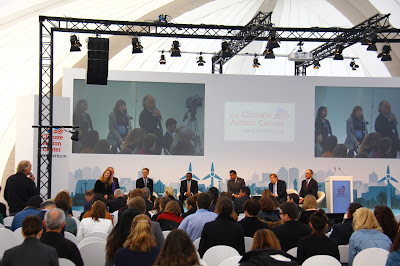Earth Science Feeding the COP
Posted by: Will Kochtitzky
with climate policy and are not impacting global carbon
emissions. In fact, these negotiations are the ground work for how our earth
science information is assimilated into the negotiation process. This makes
them vital in laying ground work for almost every other conversation at the
COP. This intra-party dialogue has fundamental implications for how information
is delivered from earth monitoring organizations to negotiating parties.
How do we monitor changes to earth?How do we measure the essential climate variables (ECV) to inform decision making?How do we quantify climate change?
At the COP, all these questions and more are asked within in
the realm of “Research and Systematic Observation”. Because systematic
observations play a key role in the UNFCCC processes there are defined
mechanisms for parties (countries) to receive information from
organizations
working to make earth observations, such as the European Space Agency, World
Meteorological Organization, among others. These groups are vital in assessing
the state of the planet and relaying scientific information to the parties. In
these negotiations, the parties also request information from scientific
bodies.
Many people may not consider these conversations important,
as they are not dealing
During COP23 I have been following the Research and
Systematic Observations informal consultations, that is to say the negotiations
around how parties ask for and receive information from different earth
observation agencies. It has been fascinating to follow how geo-political
conversations play out on this small level in this small part of the UNFCCC
processes. I wanted to highlight several parties that are the most vocal in
this process.
Fiji, Solomon Islands, Jamaica, and the rest of the AOSIS
group – The Alliance of Small Islands States (AOSIS) has been extremely vocal
in this meeting about ensuring the inclusion of the oceans in monitoring
Earth’s climate. In every opportunity these island nations have, they are
asking for the inclusion of the ocean in the draft text. This is important
because it lays the ground work for including ocean observations as a priority
in all the observation related agencies. Jamaica is particularly interesting to
observe in these negotiations because they have been calling for the inclusion
of Loss and Damage in the text wherever possible (refer to a previous post by
Anna for a description of L&D). They have always been supported by other
AOSIS and developing countries.
USA – The US has
played an interesting role (or lack thereof) in negotiations. The US was
noticeably absent in the first day of negotiations and has sent a different
representative to successive meetings, making it difficult to maintain
consistency and build relationships. While the US has not completely thwarted
the objectives of the committee, they have insisted on diluting the language of
the draft text and reject attempts from other nations to strength the proposals
for more robust inclusion of earth observation data in some processes. I don’t
think all of these amendments to the text are outrageous, but the US could be
more supportive of developing nations.
Japan and the EU – Japan and the EU are interesting
in these negotiations for a few reasons. They
are the two big space agencies in the room, although the US is also there, their presence as NASA is not felt. The EU is extremely noticeable with over 5 delegates at each meeting and multiple members of the European Space Agency attending as observers. The Japanese also have multiple delegates at each meeting and members of the Japanese Space Agency (JAXA). The EU and Japan obviously see these negotiations and earth observations as a high priority. See my earlier post on monitoring GHGs from space for more information on these space agencies. Their commitment to monitoring GHGs using satellites is impressive and it shows through in these negotiations.
are the two big space agencies in the room, although the US is also there, their presence as NASA is not felt. The EU is extremely noticeable with over 5 delegates at each meeting and multiple members of the European Space Agency attending as observers. The Japanese also have multiple delegates at each meeting and members of the Japanese Space Agency (JAXA). The EU and Japan obviously see these negotiations and earth observations as a high priority. See my earlier post on monitoring GHGs from space for more information on these space agencies. Their commitment to monitoring GHGs using satellites is impressive and it shows through in these negotiations.





Comments
Post a Comment